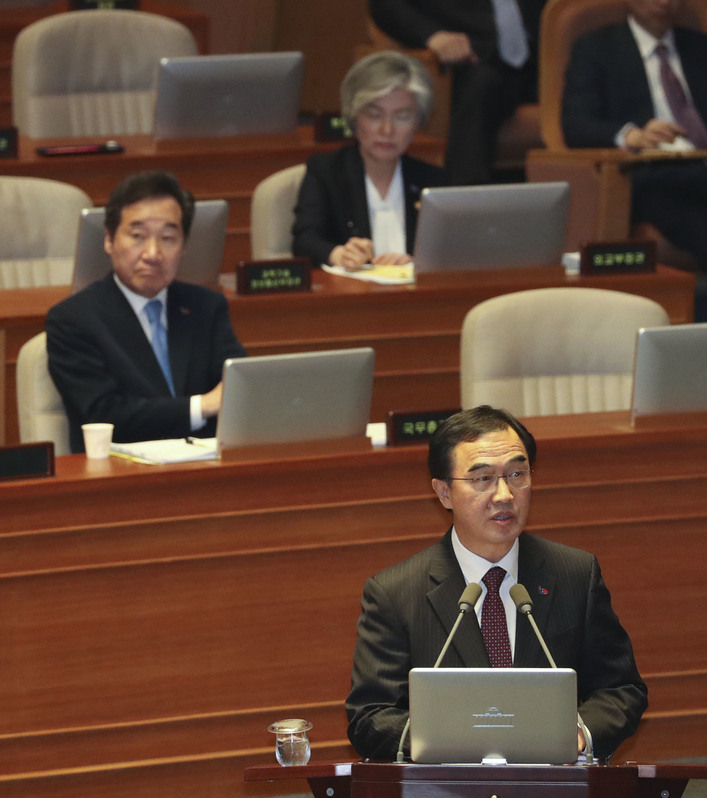 |
|
South Korean Unification Minister Cho Myoung-gyon speaks at a National Assembly Q&A session on Mar. 20. (Yonhap News)
|
Responds to questions from National Assembly regarding Hanoi summit
Minister of Unification Cho Myoung-gyon said on Mar. 20 that the transportation of refined oil products for use in operation of a joint inter-Korean liaison office in Kaesong had been “deemed not to be subject to UN sanctions.” Appearing in a National Assembly Q&A session that day, Cho explained that the products in question were “things like necessary oil items needed for other countries’ diplomatic offices or for means of transportation when our delegation travels to Pyongyang for talks with North Korea.” “The South Korean government has asked that ‘notes’ be made in the [UNSC Sanctions Committee on North Korea Panel of Experts] report when its interpretations of sanctions differ from the thoughts of the Panel of Experts so this matter will be discussed with the UN and the relevant countries,” he added. Prime Minister Lee Nak-yon also noted that “some news outlets have reported [the transportation] as a violation of sanctions, even though the UNSC Sanctions Committee on North Korea Panel of Experts report did not mention it as a violation of sanctions.” “This is extremely dismaying,” Lee added. In an annual report published on Mar. 12, the UNSC Sanctions Committee on North Korea Panel of Experts announced that it had “sent a letter to the Republic of Korea regarding August media reports of a transfer of petroleum products to Kaesong for a planned inter-Korean liaison office,” but not did specify whether the transfer had been in violation of UNSC resolutions. South Korea has explained that 338,737 kg of petroleum products were used between January and November 2018 for inter-Korean cooperation efforts, and that the 4,039 kg remainder had been brought back to South Korea. During a government Q&A session on foreign affairs, unification and national security-related matters at the National Assembly’s main session that day, lawmakers focused their questions chiefly on the Korean Peninsula situation in the wake of the North Korea-US summit in Hanoi – which ended without an agreement – as well as sanctions on North Korea and adjustments to joint military exercises with the US. Commenting on the circumstances behind the failure of the Hanoi summit to yield an agreement, Minister of Foreign Affairs Kang Kyung-wha explained, “According to the US’s explanation, they’d prepared for the summit with the goal of reaching an agreement on freezes on all nuclear, missile, and weapons of mass destruction (WMD) programs and the concrete goal of complete denuclearization, and of agreeing at the working level on negotiations for a road map to achieve that.” “The summit took place in a unpredictable situation where the final decision on denuclearization needed to be made between the leaders,” she added. When asked by Party for Democracy and Peace lawmaker Park Jie-won whether Seoul had been aware the agreement was not going to be reached, Lee Nak-yon replied, “While substantial progress had been made on the liaison office, end-of-war declaration, humanitarian aid and other issues in working-level talks between North Korea and the US, the format was such that denuclearization was put off for negotiation between the leaders. So we did consider that it might not work out.” By Lee Je-hun, senior staff writer, and Noh Ji-won and Park Min-hee, staff reporters Please direct comments or questions to [english@hani.co.kr]






